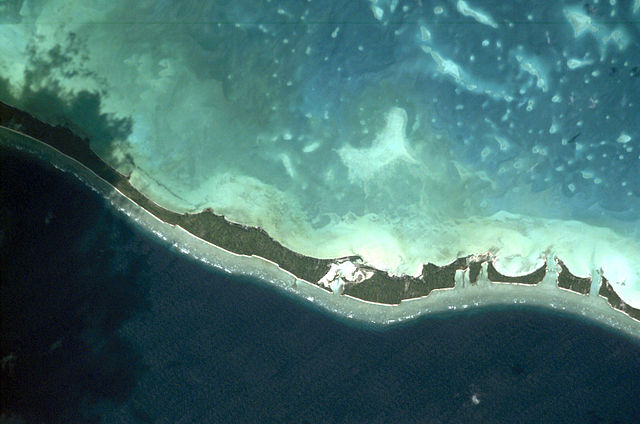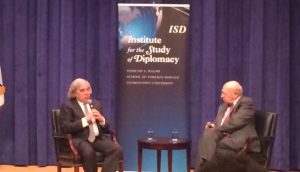Anote Tong, the former President of the island microstate of Kiribati, spoke on Oct. 17 in Copley Formal Lounge on the consequences of climate change. Tong’s speech was part of the Georgetown Global Futures Initiative’s semester-long focus on environmental issues, which also brought Secretary of State John Kerry to campus in Sept. Tong’s speech highlighted Kiribati’s struggle to preserve its culture and people while dealing with the threat of rapidly-rising sea levels.
President Tong began his speech by discussing his early advocacy for global environmental policy reform. When he first attempted to draw attention to the crisis of climate change after his election in 2003, he encountered a frustrating lack of interest within the international community. Moreover, the arguments for environmental policy reform that did exist seemed to ignore the impending humanitarian crisis in countries like Kiribati. “Even more frustrating [than international disinterest] was the focus of attention on the potential loss of habitat for the arctic polar bear, but not on our people,” Tong said.
The strategy of engaging international institutions had clearly yielded frustration for Tong. However, for countries like Kiribati, there may not be a more effective way to lobby their case on a global scale. “[Pacific Island states] simply do not have the international pull larger countries have to be able to get the attention they are seeking,” said Dr. Claude Rakisits, a senior fellow at Georgetown’s Center for Australian, New Zealand, and Pacific Studies. “So public diplomacy is a very important tool they have at their disposal to educate the international community of their plight.”
Despite initial struggles in the international arena, international discourse has started to take climate change more seriously. Tong highlighted events such as the 2011 visit of United Nations Secretary General Ban-Ki Moon to Kiribati and the 2015 ratification of the Paris Agreement on climate change as evidence of progress. Such changes in international perspectives, Tong said, have been “extremely gratifying to see.”
Aaron Silberman (SFS ‘18), the founder of the Georgetown Environmental Futures Initiative, also pointed out that the human costs of climate change have become higher-profile issues in recent years. “At present, a good deal of climate-focused activism and advocacy does focus on the human implications of environmental degradation,” Silberman said. “Climate change is about biodiversity and pollutants in the atmosphere and in waterways, but, at the same time, it is also about those communities that are suffering because of toxicity, ocean acidification, sea-level rise, desertification, and so much more.”
While progress has been made in the international community, Tong still expressed concerns about climate change as an existential threat to Kiribati. He described rising flood-control maintenance costs in Kiribati as unsustainable, but also stressed his commitment to keeping Kiribati at least partially above water in the future.
“It is my very strong conviction that at times like this, extraordinary and unconventional solutions are needed,” Tong said. He also mentioned artificial floating islands and land-reclamation construction projects as options for Kiribati to explore in the near future. “You may think these are crazy, but we have no other option,” Tong said.
While Tong highlighted ways in which Kiribati may endure as a physical country, he also admitted that Kiribati’s people may eventually have to seek new homes as the waters continue to rise. “Relocation, however reluctant we may be to do that, must be a necessary part of our strategy for adaptation,” Tong said.
However, Tong avoided characterizing people displaced by climate change as refugees and instead stressed the idea of migration with dignity. “Every country has an immigration policy, where you allow people who qualify according to criteria to come in,” said Tong. “What I’m advocating is we prepare our people so that they will fit into the criteria, so that they will be able to migrate on merit, and as a matter of choice.” Such a program, Tong argued, could reduce the likelihood of an outright climate-induced refugee crisis.
Tong’s speech was not without criticism for the developed world. “The world, to avoid catastrophic climate change, must leave the vast bulk of carbon reserves in the ground. Very simply, the world needs to burn less coal each year,” Tong said.
While such changes may be radical, Tong argued that they outweigh the costs of inaction. “We are living witnesses in Kiribati of the progressive destruction of our homeland, a fate guaranteed for others, including yourselves, if we continue with business as usual,” Tong said.
Silberman, who also interviewed Tong during the event, reacted positively to the speech. “Serious consideration needs to be given to both mitigation attempts and adaptation, for a time when vast populations will have to move because their countries are losing land and access to natural resources,” said Silberman.





